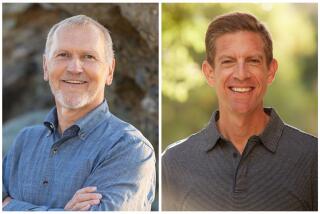Dreier Won’t Enter ’92 Republican Senate Race : Politics: The congressman from La Verne had been urged by conservatives to run for seat now held by Alan Cranston. Two candidates remain in the GOP field.
- Share via
Conservative Rep. David Dreier announced Monday that he does not plan to enter the 1992 Republican primary for the U.S. Senate, even though he has a $1.75-million campaign war chest and the urging of some conservatives who fear they may be shut out of the 1992 lineup.
The announcement by Dreier, a six-term congressman from La Verne, appears to set up a head-to-head 1992 GOP primary battle between Rep. Thomas Campbell, a moderate from Stanford, and Bruce Herschensohn, a Los Angeles conservative who works as a political commentator for KABC-TV.
Dreier, 39, did attempt to reserve the right to reverse himself and enter the battle for the seat of retiring Sen. Alan Cranston (D-Calif.) should circumstances change.
“I’ve made my decision,” he said in a telephone interview. But he added, “You can never say never and things change.”
While Dreier did not say what circumstances could cause him to change his mind, some Republicans believe he could still enter the race if Herschensohn, 58, has to drop out because he cannot raise enough money.
One Republican insider who declined to be quoted by name commented: “At this point, the ball is clearly in Herschensohn’s court to demonstrate that he is a viable candidate and a more accomplished candidate than he was in 1986,” when he finished second in the GOP Senate primary.
Dreier denied he is only putting his Senate hopes on standby in case Herschensohn’s campaign falters. One important factor leading to his decision was his increasing responsibility in the House, including election to the House Rules Committee this year, Dreier said.
Herschensohn was on vacation and unavailable for comment, but campaign manager Ken Khachigian said he considered Dreier definitely out of the contest and that “this is a two-man race” between Herschensohn and Campbell.
“Bruce is not going to get out of the race for any reason,” Khachigian added, saying he expects Herschensohn to begin reaping campaign contributions and endorsements now that Dreier is a declared non-candidate.
“We are going to be very competitive,” Khachigian said. His candidate’s July 31 campaign contribution report “will not look like Lloyd’s of London . . . but it’s going to be respectable.”
Both of California’s U.S. Senate seats are up for election next year for the first time since California entered the union.
Fear of a statewide ticket featuring three moderates--President George Bush and Senate candidates John Seymour and Campbell--had fueled a move to persuade Dreier to run for the Senate, Republican sources have said. Without a strong conservative on the ballot, some Republicans feared that many of the GOP’s most loyal voters might stay home in November.
Campbell and Herschensohn are competing for the six-year term of the seat Cranston has held for the past 22 years. Cranston, 77, long a Democratic power in the Senate, has announced he will not seek reelection because of illness.
Democrats running to succeed Cranston include Rep. Barbara Boxer of Marin County, former Gov. Edmund G. Brown Jr., Lt. Gov. Leo T. McCarthy and possibly either Rep. Mel Levine of Los Angeles or state Controller Gray Davis.
Also at stake is a two-year term created by Pete Wilson’s election as governor and subsequent resignation from the Senate. Wilson appointed former state Sen. Seymour of Anaheim to fill the remainder of the term. Challenging Seymour for the GOP nomination is conservative Rep. William Dannemeyer of Fullerton. With Wilson’s backing and Seymour’s proven fund-raising ability, Seymour is the early favorite.
Former San Francisco Mayor Dianne Feinstein is the only declared Democrat in the race, although either Levine or Davis may opt for that contest.
More to Read
Get the L.A. Times Politics newsletter
Deeply reported insights into legislation, politics and policy from Sacramento, Washington and beyond. In your inbox twice per week.
You may occasionally receive promotional content from the Los Angeles Times.











